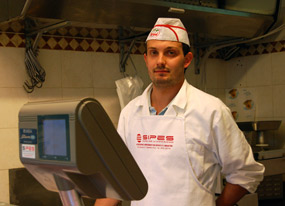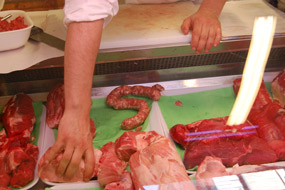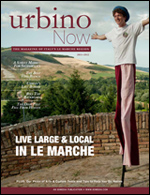URBINO, Italy – An elderly yet energetic woman backs through the curtain of wooden beads separating Machelleria Ubaldi, a butcher shop, from the sunny afternoon bustle of Via Rafaello near the center of town, still immersed in a loud and lively conversation with someone outside. Ending that exchange with a sharp laugh, she issues a quick buona sera while moving into an equally dynamic conversation with the young man behind the counter.
Buying meat in Italy is not a pre-packaged affair. Picking up steak, salami or prosciutto isn’t a case of reaching into refrigerated case and grabbing an anonymously shrink-wrapped package. It’s a trip to visit an old friend – the person who selects and cuts your dinner – as well as the line of local farmers he represents.
In grocery stores it is cheaper but can be unsafe because it is often imported from somewhere like France.
“In grocery stores it is cheaper but can be unsafe because it is often imported from somewhere like France,” said Davide Ubaldi as he slices meats behind the counter, “Butchers follow their animals from the farm to the shop, so they know where it comes from.”
For nearly a decade the Ubaldi family – Davide, with his parents and younger sister – has operated the only family-owned butcher shop inside Urbino’s city walls, the Machelleria Ubaldi. Standing behind the counter, Davide slices meats and making sausages to order with customers who are considered part of the family.
Still chatting with Davide, the older woman points to a certain cut of beef in the glass meat case, “no not that one the one in front of it,” and asks for it thinly sliced- “but not too thin like last time.” But this isn’t just about business. She also asks the butcher slicing her meat various questions about his day and family. They share a rapport deeper than taking a number would allow. The niceties continue until the not-too thin slices have been paid for and carried out through the wooden curtain.
Like this lady, the vast majority of customers that come through Ubaldi’s beaded curtain door are regulars. Most come in around the same time and day every week, often crowding the store on Saturdays. Their purchases are the end result of a hand-on production line that finds Davide following his products from the start.
One of the farms Ubaldi follows his animals from is that of Paolo Ugolini. Ugolini raises his 15 head of cattle in a family-run ranch near Urbino. He makes sure each one of them ends up in a near by shop.
“They go to local butchers that I am friends with and have personal relations with,” Ugolini said through an interpreter, ”I have no economical agreements–just relationships. Being a farmer is not a good job because people don’t give me good prices, like my friends will do.”
Ugolini and Ubaldi both noted how many butchers in Italy are ceasing to personally buy meat from their farmers, but are instead turning to the cheaper and more anonymous alternative of buying imported meats.
Signs posted around the store verify the origins of the meat Ubaldi sells. He says all of the farms distributing to him are in Italy, and are all very small. One framed paper lists one of these farms as Ugolini’s.
“The difference between us [and the super markets] is not in the type of meat we sell,” said Ubaldi, “but that the meat we have is a better quality.”
Ugolini agrees. Although he it is not recognized by the Italian Bureau of Agriculture, he said he does not feed his cows anything non-organic.
“It makes a difference,” Ugolini said of the diet, “Otherwise I would feed them the cheap stuff. But its more natural not to.”
Ubaldi points to another paper displayed on the wall with his farm verifications. It shows another difference between the family butcher and the meat counter. Ubaldi is certified to handle and sell his meats properly. This is a precaution not taken by the super market meat counter down the street.
This personal touch may be fading in Italy Food Network Channel and even the New York Times have all made note of the growing trend of “old-school butchers” in the U.S. Davide, however, has seen the opposite happen since his parents started their store roughly twenty years ago.
Rarely, he said, do any new customers even enter, a trend that has taken a toll on local butcher shops. He gestures toward the storefront of a former poultry and meat shop across the street, the most recent to close.
“People can find meats in the super markets,” Ubaldi says through an interpreter, “so now real butchers are disappearing.”
But in the meantime, buying meat for many Italians remains a social affair.


